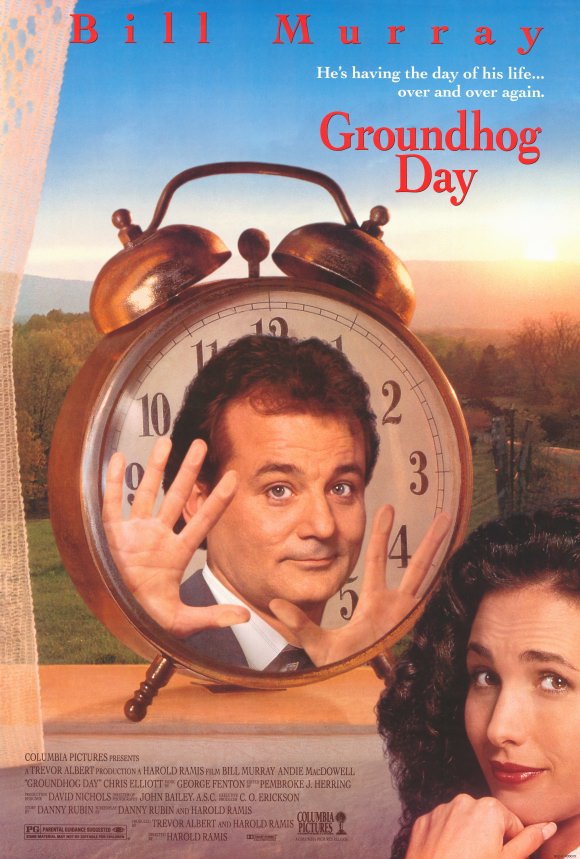 On this Groundhog Day, I found myself thinking about the Harold Ramis/Bill Murray classic film of the same name, and the dangerous way that climate change policy has been stuck in a loop. By Ramis’s accounting, Bill Murray’s character kept reliving the same day for 30-40 years, until he finally figured out how to make the necessary connection to win over his beloved. Here in the 4th decade of climate policy debates, it’s hard to admit we’re trapped just as badly. (Joe Romm had the same thought).
On this Groundhog Day, I found myself thinking about the Harold Ramis/Bill Murray classic film of the same name, and the dangerous way that climate change policy has been stuck in a loop. By Ramis’s accounting, Bill Murray’s character kept reliving the same day for 30-40 years, until he finally figured out how to make the necessary connection to win over his beloved. Here in the 4th decade of climate policy debates, it’s hard to admit we’re trapped just as badly. (Joe Romm had the same thought).
One way that this plays out is the constant urge to find stories about Republicans willing to act on climate. Given the overwhelming evidence that there’s a close link between climate change denial and conservative political ideology, it’s hardly surprising that reporters would constantly be looking for the “man bites dog” story of Republicans coming around to the need for climate action. At some point, close watchers of this dynamic get annoyed, like journalist David Roberts:
CONTEST: Who can produce the oldest "GOP stance on climate is shifting" story? Also the oldest "this Republican is sane on climate!" story.
— David Roberts (@drgrist) February 2, 2015 We can find some instances where modern reporters read this dynamic back into historical moments, including during the Johnson and Nixon presidencies. But the policy fight really started in the ‘80s, and I wouldn’t expect to see examples much before then.
To address the challenge, I poked through Lexis-Nexis news archives, and found articles matching that description as far back as 1989, when the new George H. W. Bush administration backed away from campaign commitments to make climate change a priority. Examples include Tom Wicker’s op-ed “Still Limping Along”, which notes that administration officials watered down James Hansen’s landmark Senate testomony on climate change, and charged that the delay and call for further study, “sounds like a retreat into the flaccid inactivity of the Reagan Administration on acid rain…the need to get started on global warming, however, is not in doubt.” By October, things had improved marginally, with Allan Gold reporting for the Times, “Bush Administration Is Divided Over Move to Halt Global Warming”. The report from October 27, 1989 observed, “the State Department official responsible for coordinating Government policy on global warming, William Nitze, said this week that because of growing international pressure, the United States would probably have to accept a goal of stabilizing carbon dioxide emissions.”
The scariest find, though, came from the December 6, 1989 Washington Post, where Maralee Schwartz reported a story on “Warming to the Idea of Leadership.”
In proposing that the Soviet Union and the United States host an international conference next fall to begin writing a treaty to control global warming, President Bush was accurately reading the political winds. According to a new poll, an overwhelming majority of American voters want the United States to take the lead in combating the problem.
The poll, commissioned by the Union of Concerned Scientists, found that protection of the environment, including concern over global warming and related energy policies, has surfaced as an increasingly important issue to voters. “It has found its own value on the political agenda, whereas in the past it was squelched by pocketbook, foreign policy and defense issues,” said GOP pollster Vince Breglio, whose firm Research/Strategy/Management conducted the poll.
More than 70 percent of those surveyed called for the United States to lead the fight against global warming and not wait until there is international agreement. Republicans held this view most strongly.
Bush had been criticized by environmental groups, which said he has not kept his 1988 campaign pledge to address environmental problems. His summit proposal, marking a shift in administration policy, “shows a sensitivity” to the new political agenda, Breglio said.
The environment “is becoming a political issue with some bite,” Breglio said. “Politicians will have to be more careful and demonstrate their seriousness about the issue because American voters are more serious about the issue.”
Astute observers will note that Republican voters are no longer leading the charge for the US to take action regardless of international action. A 2003 survey found public support for that proposition at about the same 7 in 10 level, but Republicans were 20 points less likely than Democrats or Independents to endorse acting alone; 93% of liberals agreed with that sentiment, compared to only 55% of conservatives. In 2014, public support for acting alone had fallen to 57% (PDF link, result on p. 35, no partisan breakdown supplied). Indeed, even agreements with the other largest carbon polluters seems to have done little to motivate the Grand Old Party to take a new perspective on climate policy. And so, like Bill Murray’s Phil Connors in Groundhog Day, we seem doomed to keep living through the same story, with small variations. And for better or for worse, we may not be able to escape this time loop until, like Rita Hanson and Phil Connors, we find a way to make conservatives fall in love with climate policy.

